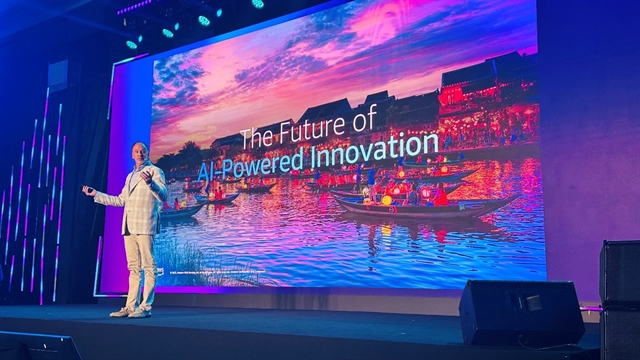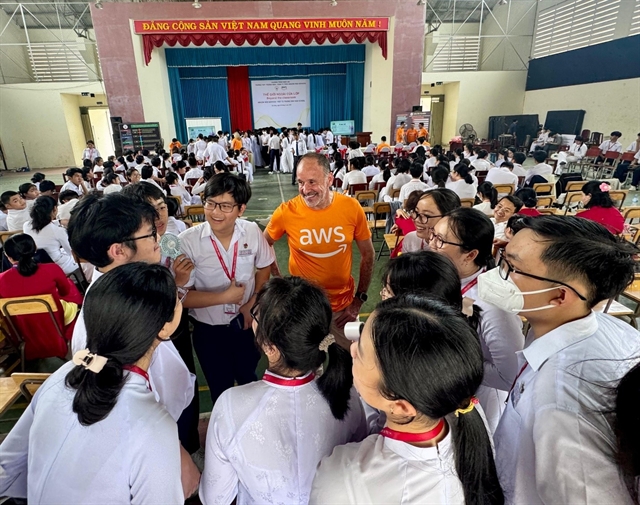 Economy
Economy

 |
| Jaime Vallés, Vice President and General Manager of Amazon Web Services (AWS) Asia Pacific Japan (APJ). Photo courtesy of Amazon |
Việt Nam is charging ahead in the artificial intelligence (AI) race, with generative AI moving rapidly from trial to full-scale production across Asia-Pacific. The country is emerging as one of the region’s most dynamic markets, supported by Amazon Web Services (AWS), which is providing secure cloud infrastructure, training local talent and helping businesses apply AI responsibly.
In an exclusive interview with Việt Nam News and Law reporter Vũ Hoa, Jaime Vallés, Vice President and General Manager of AWS Asia Pacific Japan (APJ), shared his insights on adoption trends, challenges and Việt Nam’s growing role in the AI landscape.
Gen AI is booming across Asia-Pacific and Japan. What trends are AWS seeing and how are you supporting customers as they scale from pilots to production?
Gen AI is not just about new technology; it is about business transformation. It enables companies to turn ideas into reality, improve customer experiences and accelerate innovation.
Across Asia-Pacific and Japan, we have seen a clear shift. Last year was mostly about experimentation. This year it is about production at scale. Amazon Bedrock, our fully managed service for building and scaling Gen AI applications, has grown fivefold in users over the past year. It allows businesses to deploy leading foundation models from providers such as Anthropic and Cohere securely and to apply their own data to generate insights in real time.
Adoption is happening across industries. In Japan and South Korea, manufacturers and telecom operators are using Gen AI for personalised services. In India and Australia, financial institutions are applying it to risk analysis and fraud detection. LG’s pharmaceutical arm is using AI to speed up drug development.
In customer service, AWS Connect with Gen AI is transforming how contact centre agents engage with clients. In Việt Nam, for example, VIB launched the first-in-Vietnam Gen AI assistant on its digital banking platform, ViePro, giving millions of customers a 24/7 interactive and accurate assistant built on AWS. It is helping them to increase productivity, grow their customer base and free their teams to focus on higher-value tasks.
The common thread is that companies do not just want to train models. They want to apply them responsibly with their own data while meeting high standards of security and scalability. That is why AWS is increasingly the trusted partner to move from experimentation into production.
Globally, we are supporting our customers by doubling our investment with an additional US$100 million into our AWS Generative AI Innovation Centre, which has helped thousands of customers turn AI potential into real business value. The centre combines Amazon’s decades of AI leadership and works directly with customers to deliver deployment-ready solutions in as little as 45 days, starting from real customer needs.
 |
| Jaime Vallés speaking at AWS Cloud Day Vietnam 2025 in Hà Nội. Photo courtesy of Amazon |
What are the main challenges to AI adoption in APJ, and how is AWS addressing them?
The two biggest challenges are skills and culture. Technology itself is not enough. Without people who know how to use it, AI cannot create value.
Since 2017, AWS has trained more than 10 million people across Asia-Pacific and Japan and over 100,000 in Việt Nam alone. We work closely with governments on this effort. Việt Nam’s new digital technology law is a strong example of forward-looking policy because it not only encourages AI adoption but also provides incentives for workers to gain certification.
Culture is just as critical. Gen AI is not only a technical shift but also a cultural one. Leadership must empower employees to use data and AI in their decision-making. Without empowerment, even the most advanced tools will not transform how businesses operate.
This is why we launched our APJ Innovation Hub in Singapore in June. Customers who come to this hub can have an ideation session that starts from the top with CEOs and leave with an end-to-end implementation and planning plan from us. That is a major investment AWS is making and we are planning to do this with over 1,000 COEs in the next 12 months across ASEAN.
AWS also builds responsibility into our services. Amazon Bedrock, for example, includes safeguards and guardrails that help ensure customers use AI responsibly. Security has always been central to Amazon’s approach and this is why customers trust us to bring Gen AI into production.
How do organisations scale this culture of innovation beyond the CEO’s vision?
At AWS, we believe innovation must be systemised. The first mechanism is what we call 'working backwards,' where every project begins with solving a specific customer problem rather than applying technology for its own sake.
The second mechanism is executive visioning. Leaders need to set a clear destination and then allow technology and teams to innovate towards that goal.
The third is methodology. We provide frameworks that help businesses experiment, test quickly and scale responsibly. These mechanisms ensure that innovation is not limited to top executives or a handful of technical experts.
Combined with skills development and cultural empowerment, they allow organisations to move beyond pilots and adopt AI broadly across all levels. That is how experimentation turns into sustainable transformation.
Agentic AI, where systems act more autonomously, is emerging quickly. How do you see it reshaping industries in the region?
We are in the early days but agentic AI will reshape every industry. Customer service, financial advice, agriculture and pharmaceuticals are already being disrupted.
The most exciting change is that innovation no longer comes only from technical teams. Business users, who are closest to customers, can now describe an idea in natural language and let AI generate the implementation plan.
AWS tools such as Amazon Q Developer and Kiro already make this possible for software development. We have now introduced the AI Development Life Cycle, which accelerates how businesses can move from ideas to working solutions by incorporating AI as a collaborator from the start.
This shift will allow industries across Asia-Pacific to innovate faster, experiment more directly and unlock entirely new business models.
Looking ahead, what is AWS’s vision for enabling the next wave of digital innovation in APJ?
Our vision has two parts: technology and culture.
Technologically, we provide the broadest set of cloud and AI services in the industry, making AWS the partner of choice for companies that want to scale responsibly.
Culturally, our leadership principles drive us to invent on behalf of customers and focus on long-term transformation.
We are backing this vision with large-scale investment. Since 2010, AWS has invested tens of billions of US dollars into our world-class infrastructure across APJ, including US$14.96 billion in Japan, $12.7 billion in India, $6.2 billion in Malaysia, $5 billion in Thailand and billions more in Indonesia and New Zealand.
Sustainability is also central. We reached 100 per cent renewable energy in 2023, seven years ahead of schedule, and aim to be water positive by 2030. Customers consistently raise sustainability right after AI and security in their conversations with us.
Finally, startups are key to innovation. Through AWS Activate, we have provided more than $1 billion in credits to startups across Asia-Pacific and Japan. Startups move quickly and take bold risks and that is where many transformative ideas originate.
Turning to Việt Nam, how is AWS helping drive AI adoption and where do you see the greatest opportunities?
Việt Nam is one of the fastest-growing AI markets in the region, with Gen AI adoption rising nearly 39 per cent year on year. Our new study with Strand Partners shows that about five companies every hour were beginning to test or adopt AI in 2024.
Our approach here focuses on four areas: startups, developers, regulatory engagement and customer-driven studies. We have trained more than 100,000 Vietnamese, built local developer programmes such as the Việt Nam Study Group and partnered with the government on regulatory frameworks. Việt Nam has one of the strongest developer communities in Asia-Pacific and we want to give them access to the latest cloud and AI technologies.
We see great promise in financial services, logistics and manufacturing. ACB Securities, for example, launched SMARTY, a Gen AI-powered investment assistant that delivers real-time insights to self-directed investors. In banking, Techcombank has embraced AI to attract younger customers and improve their digital experience.
Education is another priority. AWS is working with schools and universities to provide students with hands-on access to cloud and AI tools, ensuring that Việt Nam’s next generation of workers is prepared for a digital economy. For example, in June, Amazon donated 70 laptops to Trương Định High School on its 70th anniversary to help build its digital capabilities.
 |
| Jaime Vallés at Trương Định High School as part of an Amazon effort to help students prepare for the digital future. Photo courtesy of Amazon |
Việt Nam’s strong talent pool, supportive Government policies, and fast adoption rate make it a critical market for AWS. With secure infrastructure and a culture of experimentation, we believe the country can leapfrog into becoming an AI-native economy. VNS




